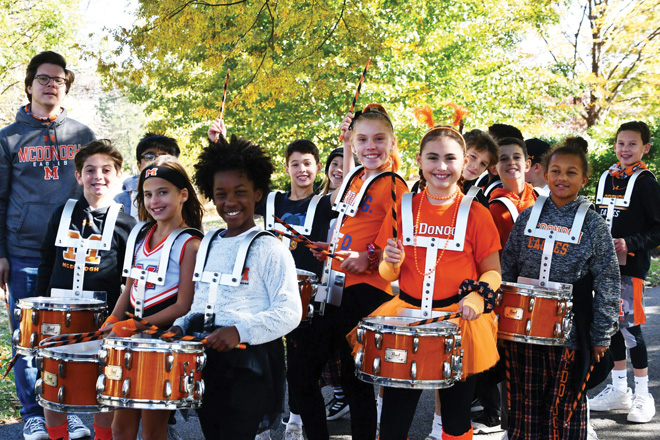Feature image courtesy of McDonogh School.
Article by Jack Hardcastle, McDonogh School,
One of a school’s most important responsibilities is keeping its community safe, and strategies to navigate shifting cultural perspectives on vaccination is an increasingly important topic for schools. At McDonogh School, we adopted a series of policies within the last several years that have maximized the vaccination rate of our student population.
Herd Immunity
In recent years, outbreaks of previously eliminated diseases have grabbed headlines around the country and the developed world. Measles, for example, was virtually eliminated in the U.S. by the year 2000, thanks to laws mandating vaccination of all school-aged children. A discredited and subsequently retracted study published in 1998, however, has caused some parents to question the safety and necessity of lifesaving immunizations.
Vaccines are effective not only through individual immunity, in which the patient receiving the treatment is protected, but also through “herd immunity,” in which a critical mass of the community is protected and so does not transmit a disease to any unvaccinated members. In any community, some members such as very young children, the elderly, and those with a compromised immune system, are unable to be vaccinated, and no vaccination is 100% effective. In our school communities, we sometimes have students with allergies to components of the vaccines or immune system concerns. To stay safe, these individuals rely on the herd immunity provided by vaccinated students and adults.
Legal Exemptions
All states permit a medical exemption for these at-risk students who cannot be vaccinated. Many states also permit other exemption categories, including religious or philosophical, in which parents need not demonstrate a medical reason to skip a vaccination. These names are misleading; no major religions call for adherents to avoid vaccination and, in fact, many faiths consider it a religious obligation.
Independent schools in many states need not wait for state or local governments to change their policies on vaccine requirements. That’s one advantage of being independent.
Beginning with West Virginia and Mississippi and, more recently, populous California and New York, states have begun to pass laws eliminating religious or philosophical exemptions. However, independent schools in many states need not wait for state or local governments to change their policies on vaccine requirements. That’s one advantage of being independent.
Phasing Out Exemptions
At McDonough, we began the conversation around vaccination by examining our priorities. Foremost was our desire to protect our entire community, including those students least able to protect themselves. That clear mandate led us to a straightforward decision to prohibit philosophical and religious exemptions, even though those exemptions are recognized by physicians and public schools in our state. From a health and safety perspective, I’d argue we could not have made any other call.
Over several years and after review with counsel, McDonogh adopted policies that permit only students with a medical exemption to enroll. Combined with a requirement that all students update their pediatrician’s physical exam form every year, this ensures that we have the highest possible vaccination rates.
The following is included in our enrollment agreement. The bold is in the original.
Students must provide accurate medical information including a record of a physical examination performed by a licensed physician to the School on an annual basis (dated within one year of the first day of classes). Students must update these medical records as their health situation changes. Students must abide by the Vaccination Requirements published by the Maryland State Department of Health and Mental Hygiene. The School only permits medical exemptions from the vaccine requirements. The School shall be permitted to transmit and share vital medical records among School personnel at its sole discretion in order to ensure the safety and well-being of students.
In 2013, we "grandfathered" a handful of our families who were already enrolled at the school that would have objected to this new requirement. Since then, we have held the line firm with newly admitted students. Six years later, those grandfathered families have graduated or moved on due to other circumstances, and McDonogh is left with only a handful of students who are catching up on vaccinations as well as those students who are medically contraindicated to vaccination.
Our biggest challenge has been ensuring that families are aware of the policy in advance of their application. Despite having the language (in bold, no less) in our enrollment agreement, we've had three circumstances in the past few years in which a family didn't realize until after they had signed the agreement that their children would either need to become vaccinated or withdraw. If that discovery happens in July when the school receives the pediatrician’s physical exam, the conversation can be uncomfortable for everyone involved. In two of those three cases, the family elected to vaccinate, and we worked with them to develop a 12- to 18-month plan to get caught up following the advice of the child’s pediatrician and the CDC’s vaccination catch-up schedule. In the third case, the family elected to withdraw before the first day of classes.
Additionally, we've had one family inquire about our rules before submitting an application; the family pushed back on our requirement, and when they were told that we would not waive the policy, they elected not to apply. We have since worked to put a notice on our admissions homepage so that our policy is clear to families during the application process.
Jack Hardcastle is chief risk officer and chief information officer at McDonogh School, a preschool–grade 12 school with 1,409 students in Owings Mills, Maryland.
To share a strategy that makes your business office more effective or efficient, email netassets@nboa.org. In the subject line, type STRATEGIES.
Download a PDF of this article.




